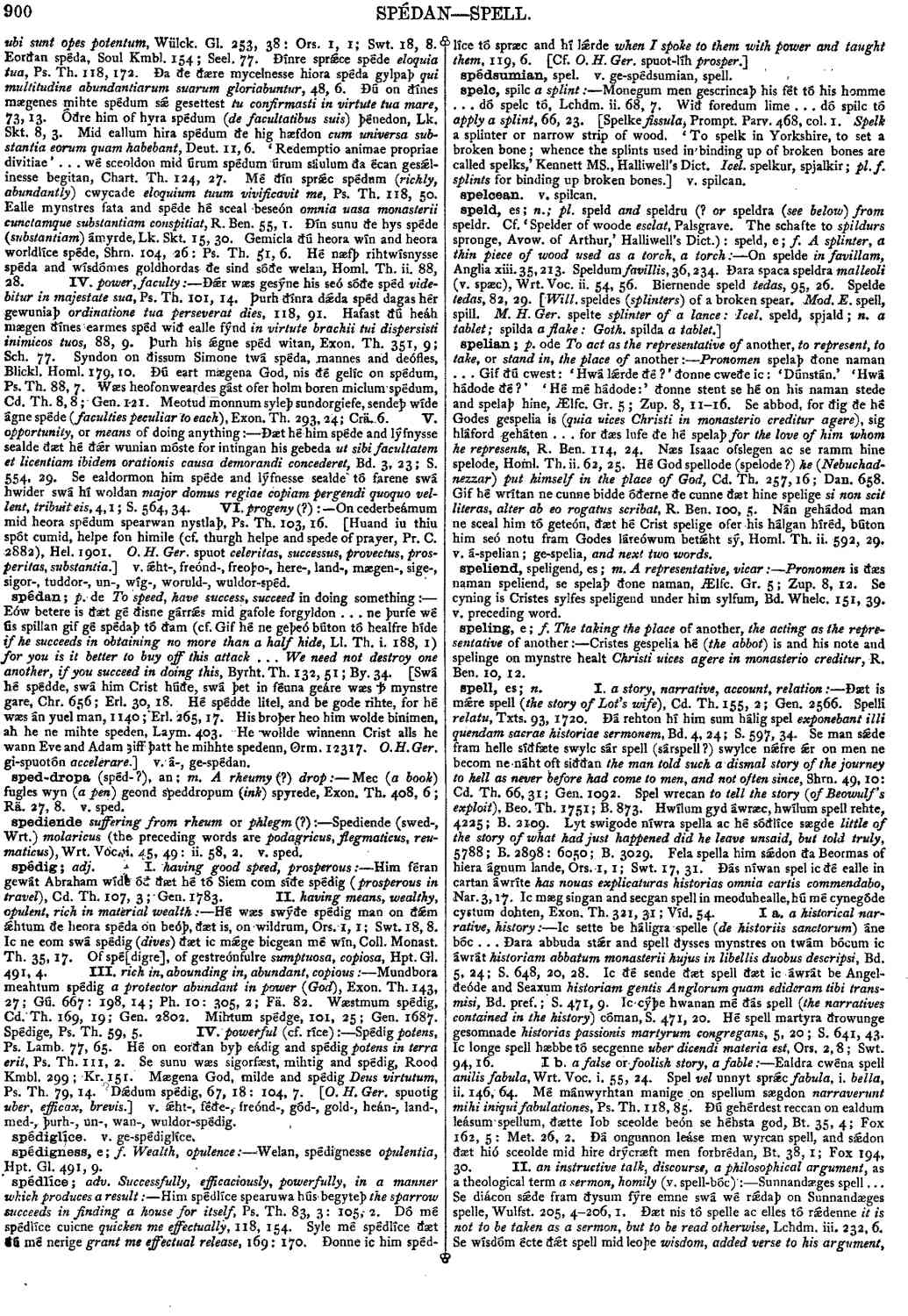spell
- noun [ neuter ]
-
Ðæt is mǽre spell (
the story of Lot's wife
),- Cd. Th. 155, 2; Gen. 2566.
-
Spelli
relatu,
- Txts. 93, 1720.
-
Ðá rehton hí him sum hálig spel
exponebant illi quendam sacrae historiae sermonem,
- Bd. 4, 24; S. 597, 34.
-
Se man sǽde fram helle síðfæte swylc sár spell (sárspell ?) swylce nǽfre ǽr on men ne becom ne naht oft siððan
the man told such a dismal story of the journey to hell as never before had come to men, and not often since,
- Shrn. 49, 10: Cd. Th. 66, 31; Gen. 1092.
-
Spel wrecan
to tell the story (of Beowulf's exploit ),
- Beo. Th. 1751; B. 873.
-
Hwílum gyd áwræc, hwílum spell rehte,
- 4225; B. 2109.
-
Lyt swigode níwra spella ac hé sóðlíce sægde
little of the story of what had just happened did he leave unsaid, but told truly,
- 5788; B. 2898: 6050; B. 3029.
-
Fela spella him sǽdon ða Beormas of hiera ágnum lande,
- Ors. 1, 1; Swt. 17, 31.
-
Ðás níwan spel ic ðé ealle in cartan áwríte
has nouas explicaturas historias omnia cartis commendabo,
- Nar. 3, 17.
-
Ic mæg singan and secgan spell in meoduhealle, hú mé cynegóde cystum dohten, Exon. Th. 321, 31; Víd. 54. I a. a historical narrative, history :-- Ic sette be háligra spelle (de historiis sanctorum) áne boc ... Ðara abbuda stǽr and spell ðysses mynstres on twám bocum ic áwrát
historiam abbatum monasterii hujus in libellis duobus descripsi,
- Bd. 5, 24; S. 648, 20, 28.
-
Ic ðé sende ðæt spell ðæt ic áwrát be Angelðeóde and Seaxum
historiam gentis Anglorum quam edideram tibi transmisi,
- Bd. pref.; S. 471, 9.
-
Ic cýþe hwanan mé ðás spell (
the narratives contained in the history
) cóman,- S. 471, 20.
-
Hé spell martyra ðrowunge gesomnade
historias passionis martyrum congregans,
- 5, 20; S. 641, 43.
-
Ic longe spell hæbbe tó secgenne uber dicendi materia est, Ors. 2, 8; Swt. 94, 16. I b. a false or foolish story, a fable :-- Ealdra cwéna spell
anilis fabula,
- Wrt. Voc. i. 55, 24.
-
Spel
vel unnyt sprǽc fabula, i. bella,
ii.- 146, 64.
-
Mé mánwyrhtan manige on spellum sægdon
narraverunt mihi iniqui fabulationes,
- Ps. Th. 118, 85.
-
Ðú gehérdest reccan on ealdum leásum spellum, ðætte Iob sceolde beón se héhsta god,
- Bt. 35, 4; Fox 162, 5: Met. 26, 2.
-
Ðá ongunnon leáse men wyrcan spell, and sǽdon ðæt hió sceolde mid hire drýcræft men forbrédan,
- Bt. 38, 1; Fox 194, 30.
-
Sunnandæges spell ... Se diácon sǽde fram ðysum fýre emne swá wé rǽdaþ on Sunnandæges spelle,
- Wulfst. 205, 4-206, 1.
-
Ðæt nis tó spelle ac elles tó rǽdenne
it is not to be taken as a sermon, but to be read otherwise,
- Lchdm. iii. 232, 6.
-
Se wísdóm écte ðǽt spell mid leoþe
wisdom, added verse to his argument,
- Bt. 12; Fox 36, 7.
-
Secgan spell
to discourse
,- 13; Fox 36, 31.
-
Gehér nú án spell be ðám ofermódum cyningum,
- 37, 1; Fox 186, 1: Met. 25, 1.
-
Ongan Waldend wið Abraham sprecan sægde him unlytel spell
held with him long discourse
,- Cd. Th. 145, 14; Gen. 2405.
-
Spella and lára rǽd-hycgende,
- Exon. Th. 301, 27; Fä. 25.
-
Ða twá béc on hundeahtatigum spellum (
homilies
),- Ælfc. Gr. pref. ; Zup. 2, 15.
-
Bæd ðæt [hé] him on spellum gecýðde, onwrige worda gongum, hú . . . ,
- Exon. Th. 171, 28; Gú. 1133: Cd. Th. 33, 7; Gen. 516.
-
Gif ðú gesihst gimmas deórwyrða findan, spellu (
parabolas
) getácnaþ,- Lchdm. iii. 214, 1.
-
Hit is swíþe ryht spell ðæt Plato sǽde (
the saying is then given
). Ðá cwæþ ic: 'Ic com geþafa ðæt ðæt was sóð spell, ðæt Plato sǽde,- Bt. 35, 1, 2; Fox 156, 8-14: 38, 3; Fox 202, 19.
-
Ic ðé mæg eáþe geand-wyrdan ðæs spelles I can easily give you an answer on the point you have mentioned, 41, 2; Fox 244, 24. III a. a saying that is to be repeated to another, a message, an announcement. v. spell-boda, I, god-spell :-- Brimmanna boda ábeód eft ongeán, sege ðínum leódum miccle láþre spell
give them a much less pleasant message
,- Byrht. Th. 133, 15; By. 50.
-
Drihten dóm forgeaf ðám ðe his spel beraþ
the Lord gave glory to those that bear his messages
,- Cd. Th. 246, 15; Dan. 479.
-
Ðá hé ðás bóc of Lǽdenum tó Engliscum spelle hæfde gewende, ðá geworhte hé hí eft tó leóþe,
- Bt. pref.; Fox viii, 9.
Bosworth, Joseph. “spell.” In An Anglo-Saxon Dictionary Online, edited by Thomas Northcote Toller, Christ Sean, and Ondřej Tichy. Prague: Faculty of Arts, Charles University, 2014. https://bosworthtoller.com/28445.
Checked: 0